#i have access through my institution
Explore tagged Tumblr posts
Text
I! HATE! ACADEMIA!!!!!!!
#i have been trying to get into this pdf for 30 minutes#i have access through my institution#but every time i try to sign on it says 'oh you've been redirected one too many times try clearing your cookies'#i cleared my cookies#i cleared my cache from the last 7 days#i closed all my other tabs#i switched from chrome to firefox and back#I CAN'T EVEN GET TO SCIENCEDIRECT.COM WITHOUT IT GIVING ME THAT FUCKING ERROR SCREEN#AHHHHHHH#jstor save me#save me jstor#anytime i try to find the full text somewhere else it just redirects me to elsevier or whatever the fuck it's called 😭😭#fuck this im going to bed
5 notes
·
View notes
Text
God i hate the american education system
#About a lot of things but right now its about me finally re enrolling for my english degree and my advisor being like ummmmmm we need#Your ap scores to give you credit for english 101 like hey maybe the fact that my previous institution already did and and that i completed#Two almost three years of an english degree already means you should just fucking waive it its fucking english 101 😐#And im giving them my goddamn ap scores they have to go through paper mail for no good goddamn reason though so 😐 maybe ill just explode#Classes start in 12 days btw 😁😁😁#Im so sorry to my academic advisor because im gonna be fucking bitchy and its not her fault but christ#Also like. They want me to? Get syllabi from my previous classes or something too? Which thats. Unreasonable hello? I dont even remember#What professors i had for those or how to access a fucking? Years old syllabus? Hello?#Anyways good morning and since im talking about college everyone keep paying attention to and supporting palestine protests on campuses
3 notes
·
View notes
Text
i have been in community with profoundly developmentally disabled peers and peers with brain damage my whole life, bc i had a childhood diagnosis. i have also been leftist my whole life; my mother was a marxist and raised me that way, and while their politics were absolute dogshit, they were lefty dogshit.
my entire life, i have seen leftist educators throw mentally disabled people away as "lost causes" because they couldn't engage with the material the way it was being presented. leftist outreach and education does, genuinely, have a massive lack of accessible material. to be blunt, people are not interested in retrofitting their leftist outreach to be accessible to people who learn best through episodes of sesame street.
as in, i have repeatedly faced outright laughter and cruelty over the idea that this could be a priority. or even something that we consider doing at all.
"people who are that mentally disabled don't need to know about these things," the kindest interpretation goes. ("people who are that mentally disabled don't interact with the world, anyway, they're all in institutions or monitored 24/7 by their parents," the uncharitable underlying assumptions go. "they wouldn't be a worker who needs a union. or a library attendee. or a member of the community garden. or a volunteer at the food bank. or or or")
the people i have seen this hurt the worst, over and over again, are profoundly mentally disabled people of color whose lack of access to accessible antiracist education is causing real danger in their lives. institutionalized disabled people of color who have learned racist ideology and behaviors from white authority, whether they were adopted by white families or incarcerated in care institutions run by white staff. who are treated lower than garbage by leftist educators, who view them as "lost causes," as unworthy of time and effort and attention, as deserving of their abuses because they... what... internalized the abuses that make up every aspect of their lives since birth?
i see people saying things in this conversation like "disability isn't an excuse for racism or transphobia or whatever, people have the obligation to improve themselves." oh, believe me, i have seen again and again how many privileged disabled people utilize their disabilities to punch down on others, try to escape accountability for their punching down by citing disability. but individual weaponization of identity is just that: weaponization of identity.
the power structures at play are what they are. it is a noble and admirable goal to want leftist outreach and education to be more accessible to all. if that is truly your goal, you must eventually reckon with the existence of people who do, actually, really need it presented in a picture book. or an episode of bluey. or a conversation where you only use examples of people they know in real life, using things that happened to them personally. the existence of people who cannot grasp forms of abstract reasoning, who need information presented as rules, or as guidelines, or as categories. the idea that yes, fully grown adults who need daniel tiger to explain racism to them are human beings who not only deserve access to that very thing, but who also deserve to be a part of leftist spaces and benefit from leftist organizing. are people for whom it might be INTEGRAL they get to be a part of leftism. are victims of racism themselves and suffering without access to antiracist spaces and community and support.
and you will need to reckon with the abject cruelty of your peers who laugh and mock the very idea of this. you need to reckon with the fact that a lot of people you respect, a lot of leftists doing genuinely good work, will respond to this by making fun of the people you're serving, even outright telling you their violent fantasies about these people. that is the experience of organizing in leftist spaces for profoundly disabled people. that is why so many of us burn out so fast. there IS a structural problem with mentally disabled people being seen as disposable and not a part of community. and it is EXTREMELY present in leftist organizing and outreach efforts.
9K notes
·
View notes
Text
It's so hard to get ahold of some academic literature that I LITERALLY HAVE ACCESS TO THROUGH MY INSTITUTION that libgen is often less of a hassle. Why is it like this
#I have to go through like three different databases and keep logging in and get redirected four times and then MAYBE I can download a PDF#that is if I don't get stuck in a log in/redirect loop#or if one of my institutions decides it doesn't actually have access and I have to go through the whole process again through another one#who designed this I just want to talk#Brydig's original post
0 notes
Text
Hello 👋
I am Maysaa Aldahdooh from Gaza
My family and I face death, hunger, and diseases every day. We are a Palestinian family in desperate need of help from anyone with a conscience, a compassionate heart, and a sense of humanity.

Help us overcome these hardships
I am reaching out to you today, standing firm as I face unbelievable challenges. Life in our area has become increasingly difficult due to the ongoing and escalating conflict, and I am struggling to secure the basic necessities for myself and my family.


About me and my family:
I am 38 years old, married to Hossam Al-Dahdoh, and we have five children: Jamal, 16 years old; Mohammed, 14 years old, who suffers from a chronic disease called Mediterranean fever and must take lifelong medication; Layan, 10 years old; Amir, 8 years old; and Zina, 4 years old.
We have faced death dozens of times. Our home was completely destroyed and burned, making it uninhabitable. We have been displaced more than 20 times, and we narrowly escaped certain death on several occasions. We have lost over 100 relatives, neighbors, and loved ones. The area where I live is constantly under attack with rockets, shelling, and gunfire. We struggle to find healthy food, clean drinking water, and my son Mohammed cannot access the medicine he needs. My children can no longer attend school. For these reasons, my family and I have decided to leave Gaza in order to protect the lives of my children from death, hunger, disease, and the effects of war, food shortages, lack of medicine, polluted water, and the destruction of educational institutions


How you can help us:
• By making a financial donation, even if it’s a small amount.
• By sharing our story on social media.
• By offering words of support and encouragement.
The funds we raise will be used for:
• Helping us with the costs of leaving Gaza and seeking refuge in a country that respects human rights, such as Canada, Belgium, or Sweden. The costs of leaving are high, with each family member needing $5,000 to leave. Since we will be starting our life from scratch outside Gaza, we will also need housing, electrical appliances, cooking utensils, education expenses, medicine, and health and psychological rehabilitation.





Every contribution, no matter how small, is important.
There is no donation too small. Every donation brings us one step closer to relief and a better future. Even if you are unable to contribute financially, sharing this campaign with your network can make a huge difference.
Thank you and gratitude:
Thank you for taking the time to read our story and for your kind generosity. You can help us get through these difficult times.
4K notes
·
View notes
Text
"the magnus protocol had a whole ARG beforehand? what?"
yes! it did!
"oh so I need to have participated in this whole big thing to actually understand the podcast?"
not at all! from the official post-mortem put out by RQ, "while the ARG was not something that was necessary to participate in to understand the magnus protocol, it was designed to contain a wealth of background story and context that would enrich any player's listening experience."
"a wealth of background context that would enrich my listening experience 👀👀👀 how can I learn about this?"
SO glad you asked. sadly, many of the materials made for the arg have been taken down since the game ended 😔 (ex., the official OIAR, magnus institute, and bonzoland websites. (edit ii: I found partial wayback machine captures! see below) though @strangehauntsuk is still up!), so we're a bit low on primary sources, but in terms of learning about what happened:
for a starting point, I would really recommend this video by @pinkelotjeart
youtube
it's super accessible, it was made in real time as the game progressed and follows the solving and revelation of clues as they happened, it hits all the major points of the mystery and moments of community insanity while eliding some of the nitty gritty puzzle grinding, 10/10 would recommend.
here's the official summary put out by RQ, and I'd recommend reading through this once you've already gotten a basic handle on the flow of the story and the basic connections between major clues and events. it's got some fun behind-the-scenes info and lays out the thought process behind the puzzles in simple terms
here's the full masterdoc of all puzzles and resolutions put together in the statement remains discord server. masterdoc my absolute BELOVED, masterdoc my bethrothed, masterdoc my soul mate. I'd recommend this as a second port of call after the above video as it either contains all details about the puzzles or links to other expanded docs that do.
here's the narrative summary doc that lays out all the plot and lore discovered in three pages of plain prose. if you just want to get to the good bits as fast as you can and get blasted directly in the face by contextless lore bombs, this is the doc for you. if you don't want to start with the video, I'd say this is another good entry point.
once you've got the lay of the land, some of the game materials that I found particularly interesting include:
the in-universe east germany expat usenet forum, with all content translated into english. most of it is irrelevant space filler with occasional extremely sus lore, but I still found it fun to read through. love to soak in some fictional forum drama.
chdb.xlsx, the spreadsheet of the names of all the children the protocol 'verse magnus institute was studying/experimenting on. EDIT: here is a version of the sheet without any annotations and with all of the names in their original order, kudos to @theboombutton for catching that the commonly shared copy had the order swapped around.
klaus.xls, a (very corrupted) spreadsheet with what looks like the classifications of a bunch of old OIAR cases.
EDIT: have a few more saved materials from the game that I forgot to include.
an in-universe audio ad to apply to the OIAR that ran before archives episodes and kicked off the whole game.
an in-universe video ad to apply to the OIAR, this one is an official upload that's still up from the game itself. you can subscribe to the OIAR's official youtube channel today, if you so chose.
the robo-voicemail greeting from the OIAR's phone line.
EDIT II:
here is a wayback machine capture of the OIAR's official website.
here is a wayback machine capture of the bonzoland website.
(pretty sure both of the above captures just archived the home pages, though I haven't tried clicking all of the links. I'd say they're still worth looking at, the home pages give a good window into the vibes.)
once you start poking around in these documents, you'll find a bunch of links to others with further information, the materials I've included here just contain what I feel to be the most relevant details to getting a broad feel for the whole game. once again, huge shout out to the statement remains server, I was barely in there as the ARG was in progress and only ducked my head in every so often to find links like these. true mvps of the fandom.
#gonna pin this for a bit because every day I get 2-5 asks saying 'there was an arg? how do I learn about it?'#tmagp#video#marina marvels at life
6K notes
·
View notes
Text
last year i started trying to write an article where i documented every reported instance of psych abuse that happened in 2023 that i could find and had to stop halfway through because it was so fucking horrific. and that was only the shit that had been reported, that i could find in databases and in local news articles. the numbers and stories of psych abuse were staggering and what was worse is that i knew it was only a fraction of the actual abuse that happened that year, and that the actual number was so much worse. And even in just that fraction of news articles, in the half the states I searched for: there were dozens of deaths. Over a hundred different reported instances of rape. Over 300 different reported instances of illegal use of restraint and seclusion.
And i just keep thinking, over and over again, about how that is just a fraction of the reality. It is almost impossible to report psych abuse as it's happening when you're locked up in a psych facility where you don't have independent access to a phone, you can get cut off from your friends and family, and your access to a "grievance and reporting process" depends entirely on the same people who are abusing you. Even after you get out, there are so many barriers. It is very, very difficult to get anyone to believe you as a credible witness once you get certain things written in your chart. Psych staff can point to your diagnoses, their documentation, and say a million fucking things to get away with abuse.
and sometimes it feels like no one gives a shit besides other psych survivors, other mad/mentally ill/neurodivergent/disabled people. this is the same shit that happened in asylums, that happened in the "reformed" institutions of the 50s, that happened in group homes, that happens in psych wards, that happens in residential treatment. it hasn't fucked changed--it's just gotten new names, hiding behind the labels of "evidence based care" and "least restrictive alternative." when i really start to think about it, i get so fucking angry and full of grief for everyone i love who is still fucking locked up in these places. it just cements my determination to never shut up about this because we need to look out for each other and take care of each other, and i do not take my freedom to even be out here and advocating for granted.
#personal#psych abolition#antipsych#survivingpsych#mad liberation#psych abuse tw#this shit makes me so mad.#and forever and always what is at the core of that rage is so much fucking love for so many people who deserve#much better. than to be discarded to a cruel system
1K notes
·
View notes
Text
If you're an American and you're really scared about the Trump administration overtaking the Institute for Museum and Library Services, I'm just going to quick break down how this works on the library side from someone who has worked in libraries, made the director handbook for libraries in my system, managed archives, and continues to engage with libraries pretty actively:
-Federal funding for the bulk of libraries in the US is far less than most people think it is. This is because the majority of libraries are sustained by local and state taxes in their area.
-Typically new developments like growing stem programs, hotspot services, and adding library locations is done through federal grants. In a few select states because of how they've structured their libraries and how new their libraries are to the system, Federal grants do technically still pay for ebook services and (less frequently) day to day operations in libraries that have less foot traffic, but still serve an important role to the communities surrounding them. A few libraries do pay additional staff via federal grants, but typically core staff are funded via state and local taxes.
-There's a whole lot of reasons why libraries are funded the way that they're funded, part of it is that conservatives at one point did argue that a library should provide enough value to its community that like it is supported only by the local and State taxes, which is a valid reason.
Another argument for why libraries don't take more Federal funding that's been popping up a lot in the 2020s is that taking a significant portion of your funding on a federal level would make you more beholden to the federal government and encourage them to begin making restrictions that impact the ecosystem of libraries and what you are allowed to have on the shelves, which likely wouldn't necessarily serve your patrons. It also would basically mean that book banners would have a place to go to push their agenda wide scale.
-all this is not to say that this isn't going to hurt libraries.
This is going to hurt a lot of rural locations, independent libraries, and summer reading programs-- which are important resources for education, socialization, and just the general well-being of our nation's youth.
These programs provide an important break for parents who have months-long stretches where their kids are suddenly home all of the time and don't have the same easy social access that they had before.
I cannot put into words just how important summer reading programs are for communities, they provide so many opportunities for kids to learn and interact and foster a lifelong appreciation of reading.
Even if you have just read a hundred books to get an ice cream cone, you were reaping the emotional and social benefits of reading, we learn so many cues in communication from reading and so much empathy.
I cannot put into words how much reading impacts child development. When you teach a child to read and you teach a child to read well, you are giving them tools to communicate with the world around them-- and summer reading programs help maintain and in some cases supplement the skills that kids develop during the school year. Learning is not something that should be restricted to just 9 months of the year.
Reading programs are important programs to the development of our nation's youth!
A lot of the additional summer programming is done through grants, and while a lot of states have really expansive Grant opportunities, the federal funding cuts in other areas are likely going to result in people looking really close at what we're spending on and why.
-one of the most important things that you can do for your state libraries is continue to use their services, show that you appreciate what they offer. If you want a program to remain, you have to be an active part of it.
Most libraries are allowed to count services in patron numbers to show interest in ebook catalogues and other things, but visiting in person and using community courses when you can helps further support the existence of branch locations.
Some states are likely going to get hit harder by this than others that have larger systems, but you using and talking about your local library helps make a case to hold onto the funding they have and look into additional ways to replace federal funding.
-what is an ungodly awful part of this is that we're going to see a lot of national libraries get hit hard by this. And national/federal libraries are typically legal libraries and special topics libraries.
It's a lot of historical preservation, information about our environment and agriculture, medical research, and technology AS WELL AS collections/limited libraries that were created via federal funding to inspire diversity and inclusion. A lot of these libraries don't have bustling locations to inspire funding via foot traffic, but they do provide resources to our library ecosystem. A really important way that they do this is by making large print, braille, playaways, and other ability aids accessible via the interlibrary loan system. They even scan items that are too fragile or precious for transport so that patrons and different systems can use them.
Just running down a short list of times that national, federally funded libraries have really helped my patrons via interlibrary loan services: one of the various libraries for the deaf and blind provided me with the cds that I needed in order to allow a patron to read the next cj box book while long haul trucking, I have received copies of photographs of people's parents on reservations via interlibrary loans and using grant funding have also uploaded photos of people's family members and newspaper articles that are relevant to their family history, I've actually received sheet music for a trombone player as a result of the various music libraries , and there was a niche queer library that mailed us so many books that were requested because we didn't have access to any of the 1970s queer pulp paperbacks and a patron desperately wanted to read the books that she had seen on shelves when she was growing up but never been brave enough to check out. (The art on their covers was wonderful)
THESE ARE IMPORTANT SERVICES TO OUR LIBRARY ECOSYSTEM. We want these services and access to these collections to remain, because you never know what is going to happen to you in this life, and because people deserve the opportunity to interact with their own history and their own culture. These will be lost if these libraries are no longer funded.
SO WHAT DO WE DO?
What can you as an ordinary person do?
1. Kick up a fight and make sure that you are hounding your lawmakers the moment you so much as sniff someone trying to defund your libraries.
2. Use all the resources that you can to show that they actually matter to you and do so while understanding that because life gets busy, your usage is also advocating for other people in the community who don't currently have the time to use those resources but would appreciate them later on.
3. Make sure you're talking about libraries and what they offer to other people, a lot of people don't know what their local library has going on.
4. Take the time to volunteer and look into ways to donate not necessarily money, but your time and resources to the library. Not every library takes old books, but some that won't put your books on the shelves will put them in the library book sales. Not every library allows volunteers to shelf, but they do often allow for people to join their friends of the library organization and help raise money and come up with community events and staff them.
5. You can donate money, but I want to note with donating money, that not every library is structured the same.
Please check with your local librarian how their donations work.
I have worked at libraries in the past where we got donated money that went into the city slush fund, and are late fees also went into the city slush fund... Which was used on a road. Not a road near us, but just a road. One that actually kind of fucked a lot of people over.
We actually had to come up with a separate method of donation for monetary things that classified them as being earmarked for specific services and usage so then the city couldn't take it. Which is insane but you know.
We would take money from patrons and ask them if they wanted to go into our general fund, or if they would like it specifically to go towards the repair of our roof.
A lot of people once they realize the reason why we were asking about the repair of our roof did in fact get heated about the way that the city was treating us, but the city still fought back about whether or not we would get to hold our own donations rather than specifically earmarked ones.
Just having people know how our donation system worked and fight for us to actually hold the money that had been donated specifically to us did make a difference in the end, because suddenly we had a roof. And, you know, some people lost seats in elections.
EDIT:
-YOU CAN ALSO START A BOOK CLUB THROUGH YOUR LIBRARY, WHICH IS SO IMPORTANT!!!
Most libraries will give you a free place to meet and promote your event, you can also engage with your community and make new friends,
aaand something that's really important is that you can show your support to the books that you love.
Not only do book clubs encourage foot traffic, they help promote different niches of offers, and form lasting community bonds. Heavy book club usage has in my experience actually shaped when we had our library hours. Like to the point where we added an extra day a week because they were coming in so frequently and they had indicated that they would keep coming in with even more people if they were able to come in on the weekend.
It also allows libraries to show that our space is being used, and have like a solid number of formalized meetings that happened there and helped us exist.
You can start a book club for almost anything in most cases, though most libraries ask for a lack of profanity in the name of your organization, and if you formally affiliate with your library then most branches help clubs acquire their books at the same time and arrange resources for whatever events you have planned.
471 notes
·
View notes
Note
do you have a post for wlw shows in specific? i dont mind just going through your main masterlist if not
as well, do you have any wlw shows w transfem leads? that one might be asking for too much, lol.
i don't have an asian wlw list yet, but i will make one here for you bun! i will only be including shows that pass my personal minimum standard for dramas. all shows are sorted in a recommended watching order
WLW
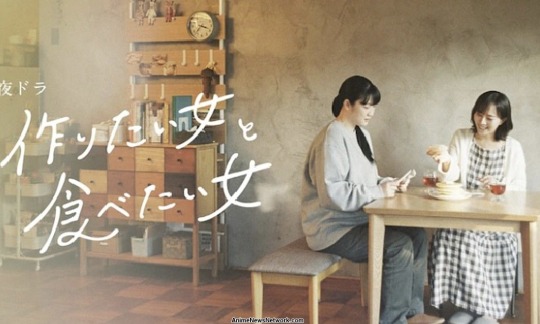
1. She Loves to Cook and She Loves to Eat neighbours; self-discovery; food; comfort watch
Nomoto loves to cook, but tends to make too much food and has no one to share it with. Luckily for her, turns out her neighbor Kasuga has a big enough appetite for the both of them.
No international streaming available, translated to english by Furritsubs, S1 & S2, watching instructions provided, consider supporting the translator on kofi.
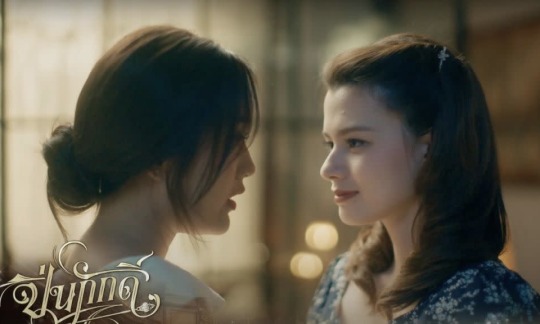
2. The Loyal Pin period drama; princess/noble lady; childhood friends to lovers; forbidden romance
A love story set in 1950s Thailand, about naughty but charming Princess Anilaphat and prim but kind Lady Pin, who are close friends and have grown up together.
YouTube
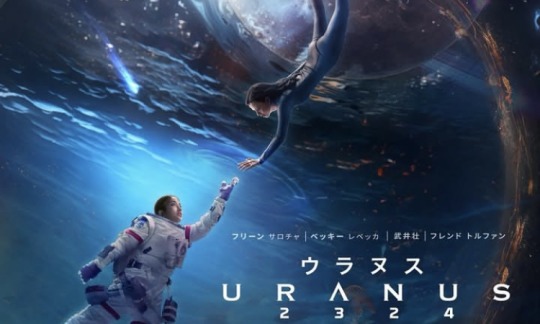
3. Uranus2324 movie; sci-fi; astronaut/diver
Story of Lin, an astronaut who is about to embark in a remarkable space mission and Kath, a passionate free diver who is willing to defy the limits of time and space just to meet with her lover over and over again.
Netflix of South Asian countries (can be accessed with VPN)
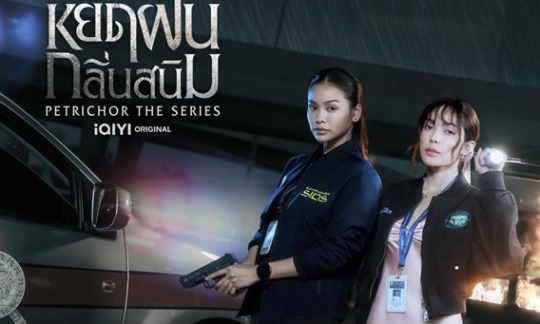
4. Petrichor crime; investigation; cop/forensic doctor
Lieutenant Tul, a rookie officer and Dr Cherran, a physician from the Institute of Forensic Sciences, become reluctant partners.
iQIYI
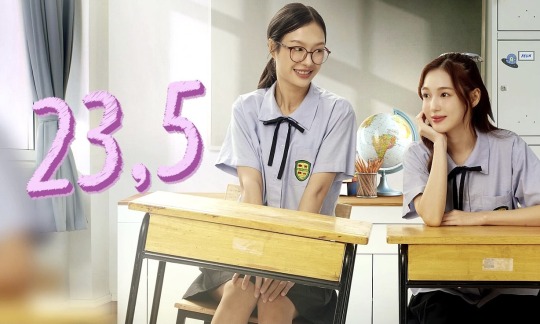
5. 23.5 high school setting; secret admirer
Ongsa moves to a new school and meets Sun, a cute popular girl who she immediately falls for. However, she decides to approach Sun in instagram dms under the pseudonym Earth, leading Sun to believe she's talking to a guy. But Ongsa does not want to lose the opportunity to talk to Sun, so she decides to keep the fact that she is a girl a secret and continue talking as Earth.
YouTube

6. Ayaka Is In Love With Hiroko office setting; comedy; misunderstanding
Ayaka, a young office worker, is madly in love with her senior team leader, Hiroko. As Ayaka tries to make her attraction known, Hiroko consistently misreads the situation, thinking that Ayaka is a straight girl.
GagaOOLala

7. Soul Sisters period drama; wuxia; crossdressing; arranged marriage
Gu Jinyu has disguised herself as a man since childhood. While undercover, she is kidnapped by Bai Yunxi, the sweet but clumsy heiress, and forced into a marriage. The two form an unexpected partnership to save the failing stronghold, facing rival plots, enemies, and challenges.
iQIYI. *Because of chinese laws demanding censorship of queerness, the romance is censored and toned down to sapphic homoerotism for the show to be able to be broadcast. Nevertheless it's pretty obviously meant to be a romance.
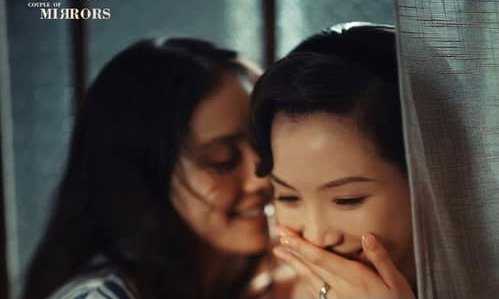
8. Couple of Mirrors period drama; socialite/assassin
You Yi is a kind-hearted socialite and a successful author. Her perfect life is turned upside-down when she discovers a betrayal by the two most trusted people in her life. With no one left to turn to, she finds refuge in the friendship and support of Yan Wei, a lonely female killer disguised as the owner of a photo studio. YouTube. the show doesn’t have a happy ending, but it can be a happy ending for you if you stop watching at episode 12 timestamp 28:02. *Adapted from an explicitly queer novel, the show is undeniably and obviously queer, but nevertheless the queer romance part is censored.

9. Affair childhood friends to lovers; love triangle
A girl's life is upended by family bankruptcy. Her best friend becomes a source of comfort. They get separated, but years later they reunite, reigniting old memories and feelings amidst changed circumstances.
YouTube & iQIYI

10. Us love triangle
Dokrak crosses paths with an older dentistry student Pam during her coffee shop shift and gradually develops a crush. When her brother Kawi meets Pam, he falls for her at first sight. Kawi turns to Dokrak, asking her to play matchmaker and Dokrak agrees.
YouTube
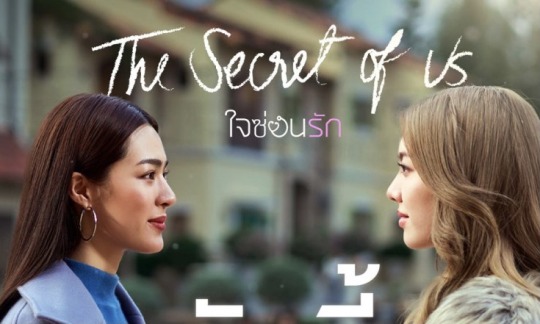
11. The Secret of Us exes to lovers
Dr. Fahlada guards her heart due to a past love, rendering her unable to open up again. Her situation becomes complicated when she has to work with Earn, her ex girlfriend, who has come to work with her at the hospital.
Netflix & Ch3+

12. Pluto twins; blind character
Twins Ob-oom and Ai-oon are worlds apart until Ob-oom's wedding, when she tasks Ai-oon with breaking up her affair with May. A tragic turn leaves the newlywed comatose, and Ai-oon must carry out the request, only to find May is blind. And fall in love with her.
YouTube

13. Reverse 4 You superpowers
One sister foretells the future, and the other controls time. When a promised love seems doomed to tragedy, the pair sets out to change fate itself.
Netflix
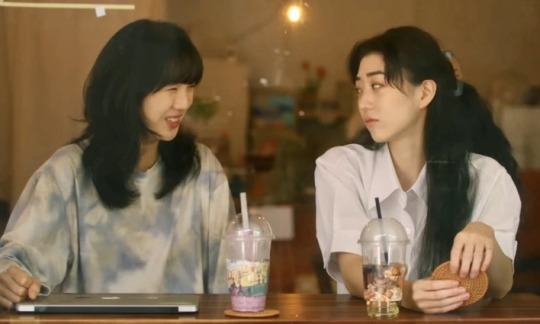
14. She Makes My Heart Flutter bar setting; niece and aunt dynamic
The extroverted Gang Seol is hired by her aunt Jung at her only-women bar. Even though they are both lesbians, they seem to be worlds apart and have very different love stories.
YouTube
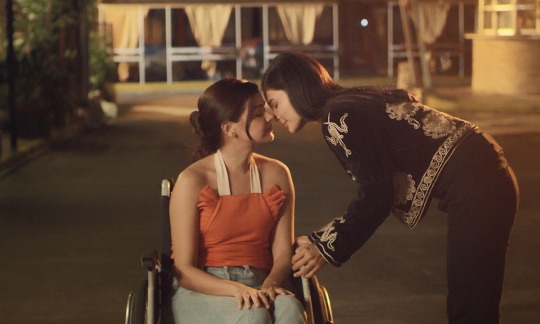
15. Sleep With Me radio; disabled character in a wheelchair
A science textbook writer with a sleep disorder meets a wheelchair-using radio host who runs the midnight shift. This chance encounter at the radio station quickly sparks their interest in each other.
GagaOOLala

16. GAP The Series office setting; boss/employee; class difference
Long after Sam first came to Mon's rescue when they were kids, Sam is unambiguously Mon's idol. In order to be near Sam, Mon gets a job working under her. When they finally meet again at the office, Mon is surprised by Sam’s icy exterior, so different from the image she'd had of her. Mon and Sam aren't just different in demeanour; they stand apart in class and age.
YouTube

17. Lucky My Love office setting
In the pursuit of love, Nabdao has been doing everything. She has got her fortune read. She's gone on a string of blind dates. Unfortunately, no one seems to be on the same page as her. She starts to think that perhaps her gorgeous and caring boss Pheem could be the one for her. Then Vela, her new team leader, comes into the picture and shakes things up with her observant and affectionate care.
YouTube
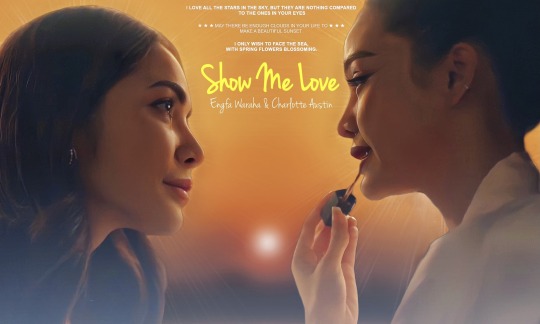
18. Show Me Love beauty pageants
Meena moves to Bangkok to achieve her singing dreams. She chances across Cherine who asks Meena to join her in a beauty pageant. The girls' journey for the crown begins and a romance between them sparks.
YouTube

19. My Marvellous Dream Is You magical dreams; actress/personal stylist
Dawan's father abandons their family to elope with a neighbor girl's father. Turns out this is Kimhan, who Dawan has been seeing in her strange yet lovely dreams for years. While they become friends in reality, Dawan hides her deeper feelings, as in her dreams their bond goes far beyond friendship. She never realizes that Kimhan shares the same dreams.
YouTube
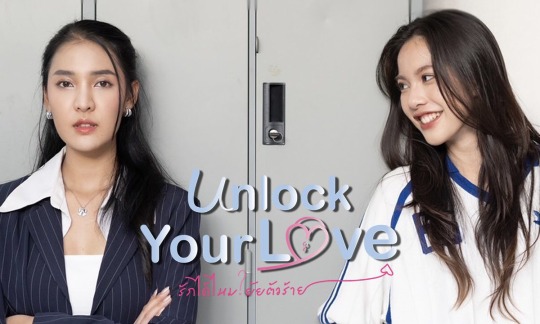
20. Unlock Your Love
Rain locked up her heart after getting disappointed in her past relationship. However, things turn around when Love enters her life. They embark on a journey to “unlock their love.”
YouTube
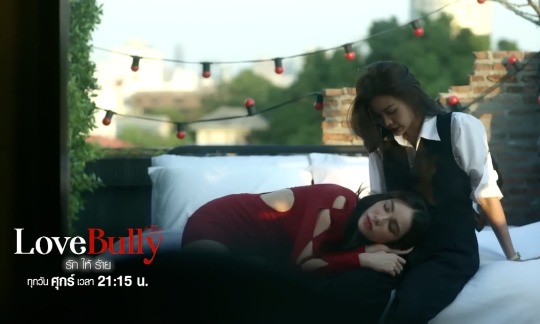
21. Love Bully barwoman/heiress; obstacles
Irene and Night meet at the bar Night works in the night Irene returns from overseas, and hit it off instantly. However, their passionate relationship is threatened by meddling people who want to ruin it.
YouTube
Various chinese WLW mini web-dramas.
Various chinese WLW short films.
WLW as side couples:

1. Wedding Plan mlm wedding planner/groom; lavender marriage
Nuea is a professional wedding planner. Sailom happens to be the perfect man for Nuea based on his visual considerations for a man. But the universe has an unimaginable sense of humor as Sailom and his fiance Yiwa turn out to be Nuea's new clients.
Uncut 18+ on iQIYI or cut on Youtube & iQIYI (special episode), girls don't have high heat scenes here so you can just watch Youtube version for them

2. Love Sea mlm rich big city writer/countryside diver; class difference; wlw personal assistant/celebrity
Tongrak is a writer of popular romance novels. After travelling to countryside in search of inspiration, he chances to meet an irritating southern man Mahasamut. When they end up in bed together, however, Tongrak finds himself hooked. Tongrak has a secretary Mook and a popular actress best friend Vi. Vi enjoys ordering Mook around as if she was her own assistant.
Uncut 18+ on iQIYI or cut on Youtube
With smaller screentime there are wlw side couples in shows: Bad Buddy, I Feel You Linger In The Air (this one has period typical homophobia and assault though, so careful).
Bigger list of asian GL shows: link [tumblr post].
Transfeminine representation in asian QLs:
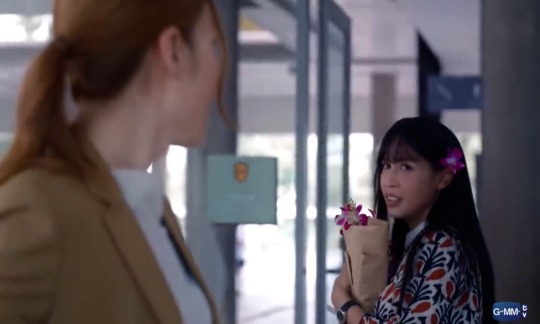
1. 23.5
Secondary couple are a pair of teachers, both of them trans women played by trans women. For now this is the only show that has a sapphic trans plotline, even though small.
YouTube
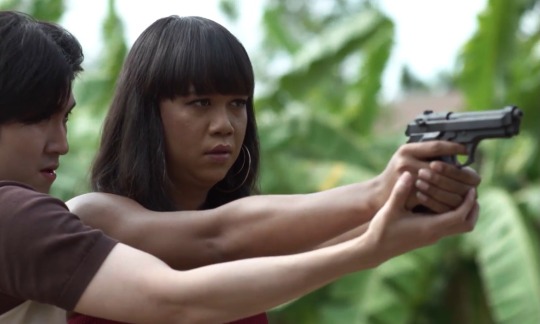
2. 3 Will Be Free polyamorous trio; on the run; mafia
After an unexpected event that involves sex work and mafia gangs, three individuals find themselves on-the-run together as they attempt to escape death. Important secondary character is a trans woman played by a trans female actress. Has a trans storyline in the show (the girl gets male romantic partners). Trigger warning for transphobia. YouTube
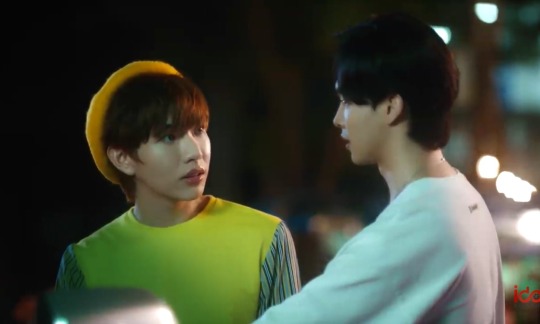
3. Secret Crush On You “nerd”/popular guy; queer friend group; university setting
A nerdy young man Toh fell in love with a popular third-year senior. Because his dream is so far from reach, observing is the only thing he could do. Toh has a queer friend group, one of them is a transfeminine/3rd gender/kathoey character Daisy. Can be a bit jarring for a western person at first, but her story is very lovely if you give this girl a chance (also gets male romantic partner).
YouTube
Noticeable small appearances of trans female characters: The Sign (the actress Yoshi was the 2019 winner of Thailand's biggest trans beauty pageant, YouTube), Not Me (YouTube), You're My Sky (Viki), KinnPorsche (iQIYI).
Sadly we aren't at a point where Thailand makes shows with trans people as leads yet, even though I so badly wish it was already a thing. But trans women and kathoey generally have supporting roles in BL and GL shows very often, so you can see them a lot in stuff! It's the transmascs who never ever appear here!
Queer shows directed by trans women and transfem people:
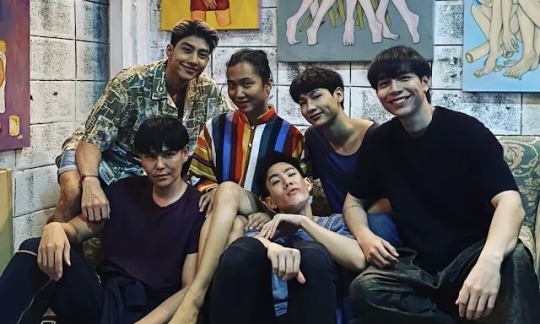
Anucha Boonyawatana is a trans woman and the director of Not Me, mlm show about anarchist freedom fighters (YouTube).
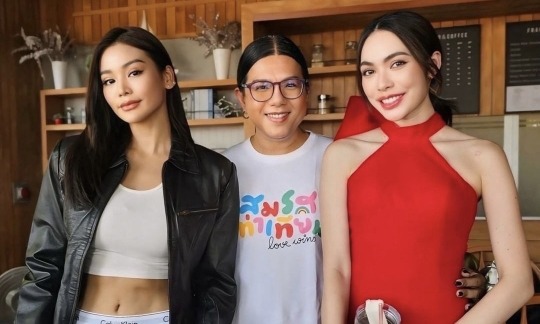
Golf Tanwarin is a nonbinary director and the first openly transgender person to have been elected as a member of parliament in Thailand. They were the one who submitted the thai marriage equality bill to parliament, which since then has been approved in 2024 and came in legal force 2 weeks ago. Their directing works: Love Bully (wlw, listed above), The Eclipse (mlm show about repressed boys in a corrupted school system, YouTube), Wandee Goodday (mlm boxer/doctor romcom, Viki).
Just in case, adding shows where I personally enjoyed headcanoning characters as transgirls or enby transfems sometimes:

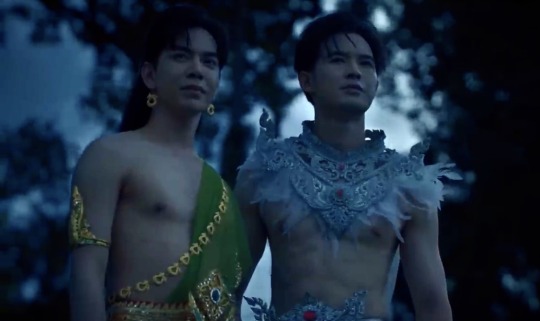
1. Meet You At The Blossom
Romantic interest is wearing female clothes and makeup for disguise in the first episodes, and despite not passing well no one questions that this is a woman. The character is happily called "wife" by the lead character until the end of the show.
YouTube & GagaOOLala & Viki & iQIYI
2. The Sign
Main character used to be a female snake princess in his past reincarnation. Sometimes played by a female actress, sometimes by a male actor, but always referred to as a princess and wearing period thai female clothes. It's also possible to headcanon the character as a transmasc here though, it's really neat.
YouTube
Many of all these shows are free on YouTube, in other cases I recommend paying for subscriptions to show appreciation and support of content in order to get more of it in the future, but if you can't or don't want to, you can watch online on KissKH or get files from MkvDrama!
Blogs you can follow to get updates and posts specifically about asian GLs: @girlsloveupdates @glgifs
#ql master guide#asks#gl dramas#ql#wlw#lesbian#sapphic#transgender#sorry im sleep deprived so there might be mistakes but if anyone notices anything tell me i will fix them#also sorry bun i wanted to make gifs but my other project is so big it took the whole night and all past nights :( i tried picking the most#fitting posters but they still don't represent the essence of those shows that well
300 notes
·
View notes
Text
Did yall know that there are several researchers actively trying to prove DID is not a real thing? Did yall know that there are several articles in the multitude of databases I have accessed through my school that ACTIVELY try to find and prove how DID isn’t fucking real???
When people tell me, “research disagrees with ___,” I hope yall realize that many researchers dont even think we exist. They dont think you can experience multiple identities. And yes, these research articles are within the past 5 years.
There are clinical psychologists with entire practices of therapeutic professionals that treat people with a focus in trauma and dissociative disorders as “untrained” and “stupid.” Not even researchers agrees on our existence, and this is NOT something you typically see within the peer reviewed articles of any popularly discussed disorder.
Many are legitimately PEER REVIEWED ARTICLES. Just keep this in fucking mind when you start saying shit like, “But research disproves your identity.” Many researchers actively try to disprove we exist in GENERAL.
Also I have yet to find a research document stating anything yall have claimed against plurality and I have easily 50-60 hours worth of digging and researching multiple databases (APA psycINFO, APA psycTESTS, Proquest psychology collection, Sage Journals, Google Scholar through a college institution, NIH, etc.). In fact, I actually have/had a few articles discussing how we need to start re-addressing DID and approaching it as psychologists.
I can probably list off several medical journals that talk about DID, provide you with at least 30-50 different peer reviewed scholarly journals, case studies, and collections, and I can confidently say that we are STILL trying to connect dissociation and trauma research.
At most, we can say that there is a HIGH CONNECTION BETWEEN cPTSD (yes, specifically cPTSD) and DID, but people are still figuring out whether you can see examples of DID in the brain through neuroimaging (which we have figured this out some, it’s super cool) and what other disorders DID is comorbid with.
We can’t be claiming SHIT about what is or isn’t right now. I am not at all a discourse account, and I most likely will not interact with syscourse outside of this, but I AM a researcher who has spent countless hours trying to better understand DID so that I can help myself and others around me. If yall were genuinely digging, yall would realize how fucking abysmal the understanding of psychology really is, let alone disorders that are stigmatized.
I WILL engage in discussing research that I have found with peer revision because I believe this education should be free and readily available to everyone. I am NOT engaging in debates on whether you believe plurality exists outside of DID. That has not been researched or discussed enough to make any sort of claim. The real point behind research is so we can better understand our world, our brains, and our society. The best we can do right now is LISTEN to the experiences people have and MAKE research to better understand their experiences.
#osdd community#actually did#did osdd#osdd system#traumagenic did#pluralgang#did community#actually osdd#did#osddid#plural#system#sysblr#syscourse#system info#dissociative system#actually dissociative#dissociation#cdd#pdid#polyfragmented#plural positivity#actually plural#plural blog#pluralblr#traumagenic#endogenic#genic terms#origins#I have more to say and will add it to this post as well
194 notes
·
View notes
Text
I get that people have complicated relationships with higher education, and that's 100% reasonable, but there's something I want to point out.
when you hear a popular podcast or youtuber or history show or see a popular history book or article say it's 'revealing' or 'uncovering' or 'bringing to light' or 'reevaluating' some story of the past, it's usually doing so off of academic history work done by people in academia.
Journalists and your average YouTuber are generally the worst about not crediting this work,* but it's there in the background, nonetheless.
That work - academic research, particularly of this kind, and the articles, books, and other information it produces - doesn't get done without institutional support. That is, like with everything, sure some enthusiasts will keep at their particular interests hell or high water, and rich folks can peruse to their hearts' content - that's what fueled the eighteenth and nineteenth centuries' ever-increasing investigative output.
And that should be concerning, not comforting.
Not because all of that output was wrong or terrible or misguided - a lot was, but much of it is still essential, foundational, exceedingly rigorous and useful - but because much of modern history work, twentieth century on, has been a century-long battle to correct some of deeply culturally embedded beliefs an almost wholly dilettante pursuit of the past generated. It's kind of a joke in English-language scholarship that the Victorians ruined everything, but like, for real, y'all, the Victorians left us some BURDENS, from fake relics created for ~the aesthetic~ to defaced and destroyed historical documents.
Academic research in itself is not some kind of panacea. we're not shitting on dilettantes (I am very much a dilettante, in my way) and so-called 'amateurs', who are vital and excellent contributors to knowledge. We're also not saying institutions are always perfect and good and don't need to change. I'm saying that robust, diverse, in-depth, careful, broadly reaching, and most of all interesting and new scholarship requires something on the scale of institutional support.
This is not just because that's where your historians live, but because in a very practical sense, that's where your archives live. You do actually need a big building stuffed with Things Of The Past well-maintained and with a core of well-trained and extremely cool (like librarians, all archivists are extremely cool in my books, even if they're kind of assholes, as long as they are good archivists).
Archivists are currently doing a lot with very little support - like a lot of academics and librarians, really - because that's what people do. When they care about doing something, they get along, they scrape by, they suck it up. But they need buildings, they need climate control, they need continuing training and new people coming into the field - if the idea is that we have so many documents from the past extant today because archives DON'T need institutional-level support, then you are severely misinformed about how much of the past has survived to the present day. And if the idea is that we'll preserve the IMPORTANT bits of the past regardless then you're also sadly misinformed about how good we are at determining what's important, and how frequently (and with growing frequency) disasters of various kinds wipe places out (Lisbon 1755, for example), and how robust any of our documentation (often ESPECIALLY the 'important' stuff) is in terms of long-term survival.
There's a theory going around that THIS period - like the 2000s through today and into the future - will produce a 'dark age' for future historians because the digital infrastructure which not only underpins almost all of our day-to-day lives but is how we've decided to 'save space' - by preserving things digitally rather than in hard copy - is so unspeakably vulnerable and weak. Everyday folks have already, for the most part, lost access to things like CDs, which have a lifespan of something like 100 years at the most. Proprietary softwares, black box devices with irreplaceable parts, flimsy modern materials with difficult to preserve features mean a whole of information that drives our lives today will simply become inaccessible in, actually, a very short time.
Archives - vast storehouses under careful supervision full of well-organized stuff that might potentially be important one day - need institutional support, but also, on their own, are kind of... well, let's just say, Historians will also say shit like they 'uncovered' a 'hidden history' in a previously 'lost, unknown' document that some archivist put in a special box on a special shelf and carefully catalogued for prime findability. It's a symbiotic relationship that doesn't always get its due. An archive on its own can be very useful to a local community, an individual business, a specific family, all kinds of things - but to get History out of it, you need some Historians or suitably rabid individuals of other castes. You need both, or you end up with the pseudo-histories of nineteenth-century rich folk that then get to determine what we believe is possible for the future by what we are told of the past. It's a bad scene.
Again, there are further steps to take - not over here defending institutions as they stand. We were, at one point, on our way to accessible higher education, meaning everyone had a chance to go to pursue their interests, before we started seeing Universities not as a social good and social resource but as job training and profit centers and cut social funding as demanded by business ghouls. Higher education and academia as it functions now has done a lot of damage to people's lives.
But institutions are much harder to build than to change, and change is hard enough. Once an archive is defunded, its collections distributed or destroyed, you typically don't get it back. Like certain species of sea creatures with long gestational periods, once you destroy the mid-range of the population - the bit that raises up the next generation - your population collapses and its very hard to get things back on track (historians and other academics who require lots of investment and training and time and experience are like the sea creatures, you see).
You can, of course, start new. We've done that a lot, as a species. It's always possible. But it's a bit like running out of a fire empty-handed instead of grabbing your wallet as you go. Sometimes you just gotta go, and that's always safest - sometimes you just can't think or there's no time to think and you couldn't get to anything useful if you wanted to - but if it's matter of looking at the wallet in your pants pocket and dipping down to grab it (and maybe pants!) while you bolt then yeah, ought to try. Maybe the pants catch fire and you've got to abandon them anyway to save your life. That's reasonable. (This is just an analogy - fire safety generally says to get ye gone with your life and health intact ASAP, just for the record - don't stop for shit and don't go back in).
The point of this is that next time you're enjoying some popular history content (please save me from this word) or learn some cool fact about the past, think about the fact that none of that get down to you without a big chain of people all joined together doing different things. And that big chain needs nice big social supports to exist. The social supports are hard to change, but the chain is easy to lose without them. It's a group effort all the way, even that little fucker who didn't credit the work they used to make fun videos is important.
That content doesn't happen without the structure to support it - or even worse, that content lies to you. Makes stuff up. The stuff it makes up isn't going to be fantasies of freedom and equality, at least going by what's been made up before.
Hate the academy, want it to change, act to reform it - all very good, go for it, no desire to stop you (except maybe the hating part, try to hate more specifically, like individual actions or aspects of the academy, if you're going to hate on stuff, but, like, hate can be unhealthy, get some peace in your life if you can). Things are bad enough without also feeling like you have to take on a crusade to save archives or other institutions - though honestly just participating in your local history scene, giving them time and attention, is really valuable help - so that's not really the call to action here. The call is just asking you to notice the big structures that enable these small joys.
Don't let yourself be convinced that they somehow happen in a vacuum, that they'll just persist somehow like getting Deliveroo at your off-grid mountain cabin. A lot people helped make that stupid podcast about Marie Antoinette's toenail fungus happen - and there's way more than that waiting! If we can just keep letting people make archives, study stuff, fuck off on fruitless searches for things that were never there and instead find stuff we never KNEW was there. There's so much of that to be done! The more the merrier on who should be doing it! But if we want that, we got to figure out how to support it, to keep what we've got, build more of it, or it'll be the same shit about Marie Antoinette over and over and over and over and over because that'll all we'll have to build from.
Anyway, if you've never done it, take a ghost tour. Visit a museum nearby. Pop into an archive and just ask them some stuff. Get on these web pages that do things like recreate Angkor Wat as a virtual tour, go watch a Youtuber do a frothing-at-the-mouth defense of Charles Lightoller, or even better, read this reddit thread about whether Dua Lipa would have survived the Titanic sinking based on her music video. And just think - holy shit, isn't it cool that we have a society, a whole social structure, that could produce such a thing? And it's right here, at my fingertips, ready to disappear.
*there are reasons for this, some related to format and legibility/accessibility that still shouldn't eliminate the need to credit others' work and others cowardly excuses for parasitism
155 notes
·
View notes
Text
Digital walls, but walls
I encourage you to have a seat and read this little 'essay' I wrote back in 2014 if you really want to understand what I'm doing today. I would be really grateful and I'm sure you'll have a much better understanding of my whole work.
Digital walls, but walls
On the way to space and public art | came across the digital walls. They can be "painted" but they also have the function of limiting, of delimiting, of separating...
A change of paradigm has been happening for some years now with the arrival of the internet, which has completely changed some aspects and concepts that have to do with the world of art and more specifically with urban art or public art. From the beginning, this type of art has been carried out in public places with the aim of being observed by anyone on the street and thus making it free, accessible and free from any premise or institution when it is created. (not considering the "warlike coexistence” with the advertising).
The appearance of the Internet has changed it. A vast majority of the art is seen online on a screen, what questions that the street is the natural canvas of this art discipline. While it is for the one who creates the piece, it is almost never for the one who looks at it. Public spaces are no longer just physical, in the same way that the plastic arts are no longer just plastic.
Due to the access to technology and its cheapness, nowadays it is inconceivable to think of art without considering the whole digital sphere, whether as a tool, a method of creation or of dissemination. But at the same time, all these centuries of art history condition the understanding of art, sometimes acting as a burden in terms of understanding what art is.
The dragging of already preconceived ideas and the weight of the genetic inheritance makes us repeat concepts about what art is and was. In the face of such a rapid change of paradigm, it seems that we find it difficult to understand that this whole new digital world is still the world. Both virtual and augmented reality are also reality, but the fact that it is appreciated through a screen sometimes causes it not to be considered as something artistic or even real. Thinking that way we could say that looking at a piece of art on the Internet does not have its complete experience, since we are not seeing it in the place for which it was devised, and neither are we perceiving it in a direct way, but with a screen as an intermediary. But at the same time, I think about all the content that we consume today with these devices - movies, series, photographs, news, and even art, current and classic - and not because of that we think or say that they are unreal.
At this point, where the analog space merges with the digital space, a new artistic expression is born that is entirely digital, where the final piece is born and ends up in the digital realm. Conceived through digital tools and deposited in the public digital space. These pieces of art suggest skipping the step of "existing" first in the ‘real reality’ to reach directly the virtual reality, which is also reality, and once from there, to have an impact on the analog reality.
It would also be curious to reflect on the parallelism between urban art and digital art, since, being in public places, both are susceptible to being stolen, altered or appropriated by other people for different purposes. And also, on the idea of anonymity, always used by urban artists to be able to work in the street without risk of infringement, and now also used in the digital environment. Either by often using copyrighted content that we find on the web (street 2.0) for an artistic purpose or by the "erosion of sharing” in which at some point someone does not credit the work, but it is still shared. In this case there should be a new word to define those people that everybody knows, but nobody knows who they are. “Famonimous" characters or the concept of "famonimity"; people or artists who are known precisely because they are anonymous.
Since the beginnings of urban art, the idea was to use public space to express oneself freely, but we must bear in mind that public space is nothing more than the remainder of the space divided by the private, the "leftovers" after the developers pass, the worthless places left open to the common people by institutions, etc., etc..... With the change of social, technological and artistic paradigm, urban art has been normalized and is now used as a method of decoration of places in poor condition, as a complement to a public road or simply as a means of open artistic expression as it has always been. Because if the initial objective was to make art accessible, direct and open to everyone, that idea has moved to the internet and, in some ways, the radical idea of urban art would no longer have that sense.
Therefore, if we understand urban or public art as a type of art accessible to everyone, free of charge and without any kind of condition, | believe that digital art fulfils this role today, since it inhabits all public places, whether analog or digital. Urban art needs this digital sphere to be able to expand and be visible. Because nowadays most urban art is seen through screens, not in the place where the piece has been created, which makes all these works more accessible to everyone at any time. And so, the ’paradox of the graffiti artist’ is born, the one who expresses his freedom in the walls that imprison him. These walls generate private spaces and what is outside them is considered public space by the mere fact of being spaces where people pass through. But it does not mean that this public space is open to intervention. Every public space is under the supervision of a privative entity, whether it is a municipality, a company or simply, the property of an individual. Public space does not exist, neither in the ‘real reality’, nor in the virtual one. It is always subject to something superior that manages it.
Within this dilemma, augmented reality becomes another alternative to the path of public art. It gives the possibility of creating art in public spaces, only seen on digital devices, and using the ‘real reality’ as the piece’s canvas. Until recently, photography and/or video were methods of capturing reality. Now, with this change of prism, these disciplines moved from being the purpose itself, to becoming raw material for the creation of other new artistic expressions. In this direction, | want to focus on the gif format. This format is strictly digital, so it gives us the option to edit, to add movement to pieces that, before, condemned to live still. We can spread in on the Internet and make it accessible to everyone at any time. When adding augmented reality, the two concepts intertwine, urban/public art and digital art, what gives rise to new artistic expressions that call into question deep rooted concepts such as museum, art and reality.
There are already many centuries researching, testing and creating the same type of art, whether sculpture, painting.... Except for the birth of new "isms" within these disciplines, it gives the impression that they are exhausted. At this point it would be convenient to think about the idea of unique work, copy, forgery, recreation... Thinking about the evolution of art we must consider that all new progress is born of the technological options that occur in each era. Nowadays, the difference is that progress happens every day, very fast, and it seems that it is difficult (or unwilling) to understand this change because of the speed of it. This cultural and genetic heritage blurs our vision and sometimes prevents us from conceiving new artistic expressions as such, since there are no previous references to support them.
But, at the end of the day, every new artistic expression, in its beginnings, was not art. "Science develops ideas that come from art that is inspired by science.” The world of classical art enjoys an aura of untouchable deity because when we are born it has always been there, but we cannot forget to think for a moment with perspective that all this classical art was created mainly by the entities of power of each era: kings, church, political powers...
This is why today (without underestimating the technique and the work of the artists) these types of classical art enjoy an invulnerability as, in the end, it was created by and for the power itself.
Then, this type of art collides with the urban and/or public art, along with digital art. In the public and digital space those who decide what is "art" are the people.
I am sure that the first Cro-Magnon who used a tuft of horse hairs instead of his own hands to paint was seen as an art/magic/belief apath.
Now we live in a new paradigm shift, but in this case it is not local or national, it is global and immediate.
A. L. Crego, 2014.
432 notes
·
View notes
Text
I'm interested in forming a sort of...math & physics reading group network. well, with some very important modifications to the concept of "reading group".
for example, right now, I'd like to learn algebraic geometry, qft, and/or refresh myself on representation theory with someone—maybe just one or two people—meaning that traditionally, we'd pick a text for one of these topics, discuss the material (asynchronously or synchronously?), exchange exercises, etc.
but currently (being Between Institutions), my best bet is posting on tumblr. and that's a pretty good bet, tbh! there are a lot of us here!
though, wouldn't it be great if there were a way to coordinate groups like this across institutions? you make a post proposing a group, specifying your goals and constraints...
even that would be a boon. but I think the concept of a "reading group" itself could be changed in interesting ways. this is what I'm really interested in.
there are variations among reading groups themselves already. sometimes you have directed reading groups, where someone already knows the material and "leads" it; some people are looking for more or less people involved; and there are probably things to explore for making sure that reading groups stick through it instead of falling apart when some motivation flags. default meeting times help with this, for example.
there are many experiments to be done! I think lessons for group-making can be taken from a maybe-surprising source: theater. there are a lot of things that make groups which put on shows more robust and rewarding than reading groups. a sense of building to something; many factors that create informal group cohesion (e.g. such a structure should make sure it creates more-informal "cafe" time in addition to more-formal "practice" time, just as rehearsal in physical spaces facilitates that casual sort of interaction on its periphery); ways to get into the right headspace during discussions (just as warm-ups do in theater; the engagement with this material is an event); clear goals (e.g. "understand ___"); successive shared accomplishments...to that end I wonder if it makes sense to form math troupes, which do successive reading groups together, drawn from its members.
it might be useful to envision some sort of public-facing artifact created as the culmination of this learning, whether a presentation, or an article, or some novel application or research...the crucial question is: how do we choose a goal that we find meaning in?
one idea, for example, is to have a collection parallel reading groups learning different things, and end by presenting to each other! that way we know what we learn will be meaningful to others, too, from the beginning. in general, I think it's important to feel that our own development of insight and understanding can be meaningful to others and to the group. it's nice to participate; it's nice to be able to offer something that is valued. what form can this take? how can you set up the interactions such that everyone has a part to play, and so this meaningfulness is tangled up in participation in the group?
I've also got a couple of ideas for "activities" that let us engage, re-engage, and play with the concepts we're learning with each other, beyond the text itself. how can we give ourselves the opportunity to toss around the concepts we're learning? I believe that the fun ultimately comes from the understanding itself, and therefore that any group exercise which lets us effectively play with the ideas will be fun.
it's a lot to ask people to come up with structure like that themselves, but using a pre-existing structure is not so difficult! sort of like how it's hard to make a TTRPG itself, so simply saying "go off and roleplay" isn't that helpful, but it's easy to use the structure of an existing one to run a game.
you might say, well, the existing form of a reading group is fine. okay! existing reading group structures can be low-stakes, relaxed, and accessible...but they can also fall apart easily (especially when not tied to an institution, in my experience), and you have to get lucky to find a truly rewarding one. I find reimagining our mechanisms of learning pretty exciting, and I think the space of ways to learn math with each other is underexplored at this level (emphasis on the with each other). there's a lot of potential!
anyway! reply or tag with "!" if this is something you could maybe be interested if done well? or if you're at least curious! I'm just taking a temperature. :)
126 notes
·
View notes
Text
Sam fumbled Gwen’s Bonzo reveal… but he’d been primed to do so
I suspect that there's going to be a LOT of conversation around Sam after this episode, and since this episode was so good that I couldn't think of a meme or shitpost, I decided I'd throw my hat into the ring and do some character analysis instead. CW: Spoilers for The Magnus Protocol episode 18, "Solo Work" under the cut.
Episode 18 finally gave us the Sam and Gwen interaction I (and I think a lot of others) have been so desperate to finally see, and boy oh boy do I have Thoughts… none of which are new per se, but Sam’s reaction to Gwen dropping the Bonzo Bomb seems to have reinforced the way I’ve been reading (and projecting in fanfiction oops) Sam, his personality, and his motivations.
Out of everyone new we’ve been introduced to so far, Sam has by far gotten the most explicit development and conversation around his personality. Even before episode 1, folks who participated in the ARG got a preview of our favorite baby shrimp’s personality through access to the child database spreadsheet that was, presumably, used to document the results of the experiments run on children participating in The Magnus Institute’s “gifted and talented program.” From this spreadsheet, we can gather that Baby Sam is logical, empathetic, works towards the benefit of others (prosocial), and fair… but also a rule follower and highly willing to follow the lead of an authority figure, even if it is in conflict with his personal views. The picture this information paints is an interesting one, but when taken in a vacuum leaves us with an impression of Sam as someone who is kind but lacking in backbone.
This idea of Sam as “kind but lacking in backbone” is further reinforced in canon, as Alice of multiple occasions rags on him for being “noodly” and “ickle fawn” and a “baby shrimp,” all seeming to highlight that Sam has the sort of helplessness about him typically ascribed to sopping wet kittens and baby birds. And I think that if we view Sam’s outburst when Gwen brings up Bonzo through this lens alone, it’s going to seem WAY out of character for him and a downright cruel response.
Now while I do believe that Sam is empathetic and fair and, sometimes, a little helpless, I’ve been inclined to believe from early on that much of Sam’s affable self-deprecation is a way to cover or soften what can be, at times, a tendency to be hard-headed, temperamental, a little manipulative, and petty (and I’m totally not just saying that as a people-pleaser-and-gifted-kid-in-recovery who has been projecting hard on Sam since Day 1). And it’s this second batch of personality traits, the ones that make Sam so real and interesting to me, that I think set up the disaster of a conversation between Sam and Gwen.
We have definitely seen hints of Sam’s hard-headedness and manipulative leanings in previous episodes: it comes out most often around Alice, showing his stubbornness in the form of refusing to give up his lines of questioning and curiosity about what is happening in the cases and at the OIAR; and revealing his willingness to manipulate a situation the form of subtly redirecting Alice’s focus away from prying into his crush on Celia and during the mocha incident (I have, of course, already explored Sam’s manipulative tendencies in my totally comprehensive shitpost).
And we’ve even been shown at times before episode 18 where Sam can be petty, his buzzed insistence that Alice try and keep things “professional” at work after his date with Celia being at the top of the list. The case headers filed for “Putting Down Roots” and “Pet Project” also suggest to me Sam’s ability to be stubborn and petty: in both instances, Alice and Gwen suggest a different classification than the one that Sam ultimately files. In the case of Gwen in “Pet Project,” she’s dismissive of him when he tries to ask if she’s all right.
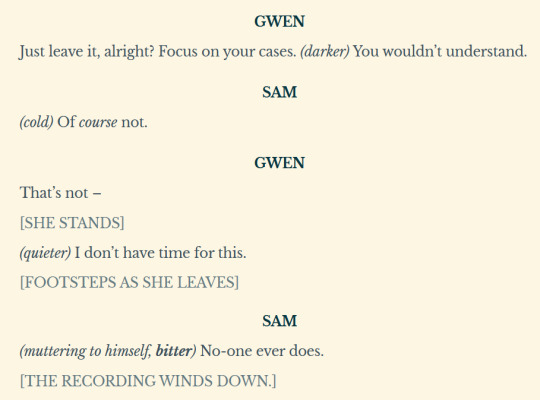
While there’s no way to know for sure, I interpret this interaction as part of the reason why Sam ultimately disregarded Gwen’s suggestion for how to file the case—she shut him down and shut him out, and the petty part of his heart couldn’t resist ignoring her recommendation out of spite. This scene also begins to lay the foundations for Sam and Gwen’s interactions in episode 18 and, I suspect, the rest of the season.
So with all of this in mind, let’s look at episode 18. When Gwen emerges from Lena’s office, Alice has just finished shutting Sam down, again. Throughout most of this season, Sam has been desperate for some validation that the cases they are listening to are real, that whatever happened to him at The Magnus Institute was real, and that him pursuing this line of questioning and wanting to find answers isn’t a waste of his time. Alice has, of course, been not-so-gently nudging him away from this line of thinking for most of the season, while Gwen has been icing him out about it up until this point. Just about the only one who has given his questioning any air has been Celia who is, conveniently, not there. Even after Alice has her very own supernatural experience that is reaffirmed in the case Sam receives, she strongly pushes back on his idea that they should investigate and pursue this further. He understands why she doesn’t want to learn more, but it’s clear that he’s still frustrated at the end of the conversation.
Enter Gwen. Here, for the first time, it seems like she’s opening up about what is going on at the OIAR, and Sam is immediately hooked, even dropping his softer and sympathetic side when Alice tries to redirect with one of her classic barbs.
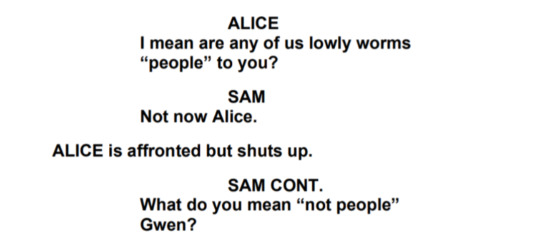
After being shut down time and time again, Sam is so eager for confirmation that there is more to all of this than meets the eye. And then Gwen says the B-word, and Sam loses it.
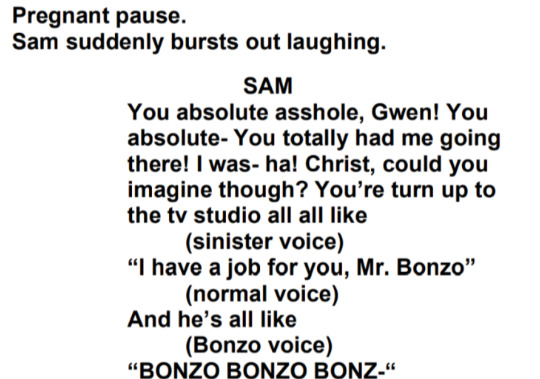
Sam is laughing here, but honestly? I think he’s angry, and his reaction is one of complete disbelief that Gwen would set him up like this just to, in his mind, take the piss out of him. He thinks that, at best, Gwen is having a breakdown and he’s once again being shut out or, at worst, Gwen is making a joke at his expense. Now, he’s used to being the butt of a joke thanks to being friends with Alice, but despite that we’ve never heard him call her an asshole the way he does Gwen. Temperamental and petty, turning around his hurt and anger over being stonewalled again and again to lash out at Gwen with his joke.
And honestly, can you blame him? (I can’t.)
Of course this wasn’t the ideal reaction. I have been waiting for Sam and Gwen to have a serious heart-to-heart about what’s going on forever, and Sam pretty much blew that chance without even realizing it. And I would be surprised if we get an apology out of him anytime soon, not only because this interaction is likely to push Gwen away from wanting to even be around Sam, but also because he’s not going to believe that Gwen wasn’t making fun of him or that Gwen isn’t having a delusional breakdown until he sees Mr. Bonzo with his own two eyes.
I also think this conversation would have gone very differently had Celia been there instead of Alice. Sam’s slew of psychological testing suggests he’s willing to follow the leader, and in this case he doesn’t seem immune to Alice’s general dismissiveness of Gwen. He may have even been primed to lash out at Gwen in this moment because Alice is constantly ragging on her; chameleon-like, he’ll take on the shade of the strongest personality when he’s on uncertain or dangerous footing. It’s almost a guarantee that Celia would have taken Gwen seriously, not only because she’s likely from or connected to the TMA-verse of horrors, but also because it was Celia who received the first Mr. Bonzo case. And had Celia been there to temper the disbelief, Sam would have absolutely been ready to hear Gwen out in full. I honestly cannot wait for Celia to be back in office; she’s going to walk in to these new, rancid office vibes like Troy from Community walking into the whole room on fire while casually carrying the pizza.
So, what do I think this means for the rest of the season? Well, the title of this episode seems telling: Solo Work. Gwen and Sam’s respective desires for their experiences to be validated and their goals to be taken seriously paired with the seeming dismissiveness of those around them are going to push them along their separate paths, dangerously alone. And I suspect that it is only going to be Celia or, more likely, an encounter with Bonzo, that is going to put them back on the same path—if it happens at all. Good luck, babes!
#The Magnus Protocol#tmagp#tmagp theory#tmagp spoilers#The Magnus Protocol spoilers#tmagp ep 18#tmagp solo work#samama khalid#Sam Khalid#gwen bouchard#the magnus institute#character analysis#sam khalid character analysis#Teal's TMAGP takes
476 notes
·
View notes
Text
The Class Dynamics between James Potter and Severus Snape: A Critical Analysis:
This is a dedication to all those who say that class has nothing to do with the bullying that James exerted on Severus, to those who claim that James couldn't be classist because "he never proactively despised anyone for being poor" or because "he was friends with Remus," to those who say "Snape also attacked him" or suggest it was a "rivalry" and that they were on equal footing, or simply to those who say they are "fictional characters" and that fiction has nothing to do with reality, blah blah blah. This is something I have written with bibliographical references because, once in a while, I can stop being a simp goof and show off my university degree in political science. And yes, I am going to be an authentic pedant because I can, and because many people seem to live in a candy-coated world regarding these issues, and it wouldn't hurt them to get a bit educated. That said, here goes my essay:
When analysing the interactions between James Potter and Severus Snape in the "Harry Potter" universe, it is common to find vehement defences of James, arguing that his bullying was not class-motivated. However, it is crucial to untangle how class dynamics operate structurally and how this influences interpersonal relationships. James Potter, as a member of a wealthy, pure-blood family, represents the dominant class, while Severus Snape, coming from a poor, working-class background, embodies the subordinate classes. In the magical world, pure-blood lineage is associated with inherited privileges similar to aristocracy in the real world, where blood purity is a marker of status and power. Authors like Anderson and Löwe (2006) have explored how heritage and lineage have been determining factors in the distribution of power and privileges throughout history, both in fictional and real contexts. This socioeconomic background plays a crucial role in the power dynamics between characters like James and Severus, highlighting how class structures affect their interactions and perpetuate inequality.
Social class, according to Marxist analysis, is a structural category that determines individuals' positions within society based on their access to the means of production. In "Harry Potter", pure-blood status equates to magical aristocracy, while Muggle-borns, Half-Bloods with muggle parent and those from humble origins, like Snape, represent the working or marginalised classes. James Potter, on the other hand, embodies the privileges of the elite, not only through his wealth but also through his lineage, which grants him a status that influences his interactions with others.
The bullying James exerts over Severus cannot be disconnected from its socioeconomic context. Although James may not have explicitly expressed disdain towards Severus for being poor, the way he exploits his superior position to humiliate and subdue Severus reflects power dynamics based on class. Pierre Bourdieu describes how power structures are reproduced through symbolic violence, where the dominant classes impose their cultural and social legitimacy over the subordinate ones, perpetuating inequality. In the context of 'Harry Potter', this symbolic violence is reflected in how the magical aristocracy imposes its values and norms on those of humble origin. The public humiliations James inflicts on Severus are not just acts of bullying but also manifestations of a structural power that favours the privileged like James. Besides Bourdieu, other theorists such as Michel Foucault could provide complementary perspectives on how power is exercised and perpetuated in institutions, in this case, Hogwarts as a microcosm of magical society.
In James and Severus's case, this symbolic violence manifests in the public humiliations James inflicts on Severus, using his status to ensure there are no significant repercussions. James's position as a popular and privileged student grants him social immunity that Severus, due to his humble origin, cannot counter. This demonstrates how class structures influence the dynamics of school bullying, where resources and social capital determine which behaviours are acceptable and which are not.
The "Harry Potter" fandom often minimises James's actions, portraying him as a mere prankster without malice, while pathologising Severus's response, attributing it to resentment and bitterness. This narrative reinforces the whitewashing of the actions of the rich and popular to the detriment of the poor and marginalised. Theodor W. Adorno and Max Horkheimer, in their "Dialectic of Enlightenment", explain how the culture industry and hegemonic discourses contribute to naturalising domination relationships, presenting them as inevitable or even fair. Their analysis reveals that modern media perpetuates class dynamics by presenting power structures as natural and immutable. This can be observed in how the dominant narrative in the 'Harry Potter' franchise tends to glorify high-class characters like James while marginalising figures like Severus, whose resistance to the system is viewed with suspicion or disapproval. Contemporary studies, such as Mark Fisher's "Capitalist Realism" (2009), also highlight how media reinforces the current economic and social status quo, making it difficult to imagine alternatives to the existing system.
By justifying James's bullying as mere youthful pranks, the fandom perpetuates a narrative that excuses the abuse of power and classism, ignoring the impact these actions have on individuals like Severus, who are already in a structurally disadvantaged position. This reinforces social hierarchies and strips victims of their agency and dignity.
Severus's portrayal as a bullying victim is intrinsically linked to his social class. His marginalisation is not just a product of his actions or personal choices but a consequence of social structures that privilege figures like James Potter. Antonio Gramsci's theories on cultural hegemony are useful here to understand how the dominant class's ideas are imposed as normative, silencing the oppressed voices and legitimising the violence they suffer. In the 'Harry Potter' narrative, this hegemony manifests through the glorification of the values and behaviours of pure-blood characters like James, while the perspectives of the marginalised, like Severus, are dismissed or vilified. For example, the Marauders, led by James and Sirius, both rich pure-bloods, are portrayed as mischievous heroes despite their aggressive behaviour towards Snape, who is depicted much more negatively even when acting in self-defence. This reflects how cultural hegemony shapes public perception, perpetuating a value system that favours the privileged and marginalises the oppressed. Authors like Stuart Hall have explored how media and popular culture reinforce these hegemonic structures, underscoring the need for critical analysis to dismantle these dominant narratives.
Severus, in this sense, represents those who are constantly repressed by power structures and whose narrative is distorted to fit a worldview that favours the privileged. His resistance and eventual adoption of extreme ideologies can be understood as a response to this marginalisation, a desperate attempt to reclaim agency systematically denied to him.
To fully understand the relationship between James Potter and Severus Snape, it is essential to acknowledge the influence of class structures on their interactions. The narrative that minimises James's bullying and blames Severus perpetuates a simplistic and biased view that ignores the complexities of social inequality and power. By applying a critical analysis based on Marxist theories, we can unravel how classism permeates these relationships. Studies on young adult literature, such as those by Maria Nikolajeva, and the analysis of victimisation frameworks in popular culture by Henry Jenkins provide a theoretical framework that reinforces the need to re-examine fandom's conceptions to avoid perpetuating these structural injustices. These investigations highlight how narratives of power and oppression are often shaped by dominant interests and how this affects the public's perception of marginalised characters like Severus.
#severus snape#pro severus snape#severus snape defense#severus snape fandom#pro snape#james potter#harry potter#sirius black#harry potter meta#severus snape meta#severus snape analysis#james potter analysis#james potter meta#james potter critic#classism#marxism#literature analysis#marauders fandom#marauders stans#james potter stans#the marauders#the marauders fandom#marauders era#professor snape#snapedom
167 notes
·
View notes
Text
Hello👋
I am Maysaa Aldahdooh from Gaza.
My family and I face death, hunger, and diseases every day. We are a Palestinian family in desperate need of help from anyone with a conscience, a compassionate heart, and a sense of humanity.

Help us overcome these hardships
I am reaching out to you today, standing firm as I face unbelievable challenges. Life in our area has become increasingly difficult due to the ongoing and escalating conflict, and I am struggling to secure the basic necessities for myself and my family.


About me and my family:
I am 38 years old, married to Hossam Al-Dahdoh, and we have five children: Jamal, 16 years old; Mohammed, 14 years old, who suffers from a chronic disease called Mediterranean fever and must take lifelong medication; Layan, 10 years old; Amir, 8 years old; and Zina, 4 years old.
We have faced death dozens of times. Our home was completely destroyed and burned, making it uninhabitable. We have been displaced more than 20 times, and we narrowly escaped certain death on several occasions. We have lost over 100 relatives, neighbors, and loved ones. The area where I live is constantly under attack with rockets, shelling, and gunfire. We struggle to find healthy food, clean drinking water, and my son Mohammed cannot access the medicine he needs. My children can no longer attend school. For these reasons, my family and I have decided to leave Gaza in order to protect the lives of my children from death, hunger, disease, and the effects of war, food shortages, lack of medicine, polluted water, and the destruction of educational institutions

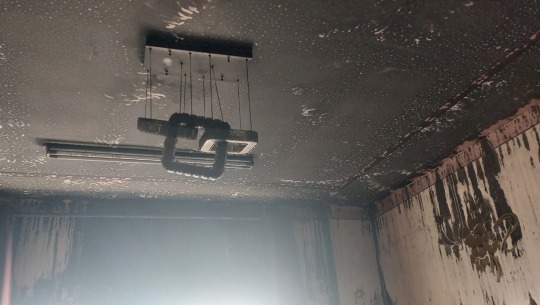
How you can help us:
• By making a financial donation, even if it’s a small amount. • By sharing our story on social media. • By offering words of support and encouragement.
The funds we raise will be used for:
• Helping us with the costs of leaving Gaza and seeking refuge in a country that respects human rights, such as Canada, Belgium, or Sweden. The costs of leaving are high, with each family member needing $5,000 to leave. Since we will be starting our life from scratch outside Gaza, we will also need housing, electrical appliances, cooking utensils, education expenses, medicine, and health and psychological rehabilitation.





Every contribution, no matter how small, is important.
There is no donation too small. Every donation brings us one step closer to relief and a better future. Even if you are unable to contribute financially, sharing this campaign with your network can make a huge difference.
Thank you and gratitude:
Thank you for taking the time to read our story and for your kind generosity. You can help us get through these difficult times.
Maysaa AlDahdoouh
#free palestine#free gaza#gaza genocide#gaza strip#gazaunderattack#gaza#save palestine#palestinian genocide#i stand with palestine#all eyes on palestine#save gaza#all eyes on rafah
353 notes
·
View notes